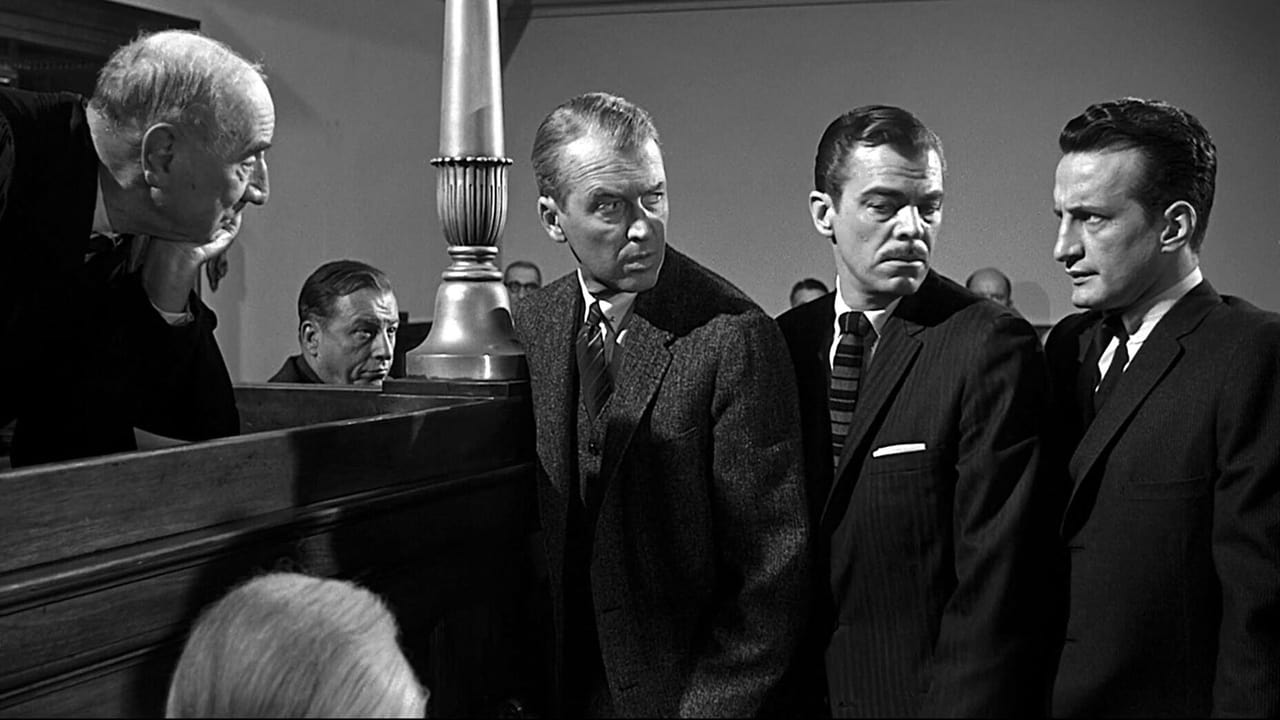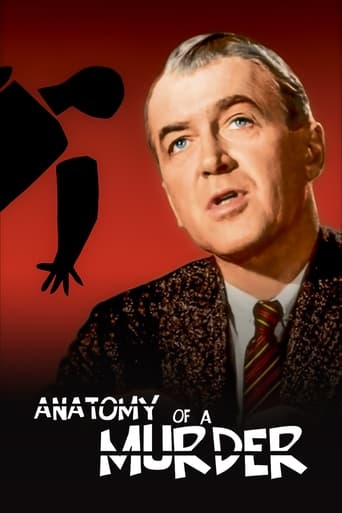



Disturbing yet enthralling
I didn’t really have many expectations going into the movie (good or bad), but I actually really enjoyed it. I really liked the characters and the banter between them.
View MoreIf you like to be scared, if you like to laugh, and if you like to learn a thing or two at the movies, this absolutely cannot be missed.
View MoreIt is interesting even when nothing much happens, which is for most of its 3-hour running time. Read full review
View MoreAnatomy of a Murder is a great showcase of the defense lawyer and the prosecutor, though unendearing.It is certainly an engaging court room drama, but it lacks being anything more than that, so I wouldn't call it a great film. James Stewart and George C Scott are terrific in the their roles, but most of the other characters failed to bring much to the film. With the long run-time it certainly needed more.
View MoreThis might have been a stunning movie for 1959, but I fail to see how it holds up in the Twenty First Century. If one could get away with a murder rap using that 'irresistible impulse' argument, I think there would be a lot more murder trials today, not to mention a whole lot more killers running around loose. I mean really, a 'psychic shock' which creates an almost overwhelming tension which a person must alleviate, by KILLING SOMEBODY!!! I know there are real live cases of temporary insanity that have gotten people off the hook, but in those situations, the accused is usually deranged enough to merit the argument. I don't see how it worked here, except of course, as being a product of it's times.Even the courtroom drama seemed a little bizarre to me. I can understand the prosecuting attorney Mitch Lodwick (Brooks West) making all those challenges to Paul Biegler's (James Stewart) questioning of witnesses, but couldn't figure out why he thought they were out of bounds. Why wouldn't the alleged rape of Manion's (Ben Gazzara) wife be relevant to the case? It's why he killed bar owner Quill! Or the photographer's pictures of Laura Manion (Lee Remick). If they could corroborate the fact that she got beat up by Quill, even if she wasn't raped, putting them into evidence should have been a no-brainer.There's also that scene in which Mary Pilant (Kathryn Grant) rolled over so easily when Biegler asked her to get the bartender to cooperate with his investigation. Any other person would have told the attorney to take a hike if it was going to implicate her own father. That scene just didn't pass the smell test for me.But with all that, I still thought the film was fairly compelling in the way Biegler sniffed out his opportunities and played them out for the court. Some of his over the top antics didn't seem realistic but he was putting on a show for the jurors. I liked Judge Weaver (Joseph N. Welch) by the way, I was surprised to learn he was a real life attorney during the Army-McCarthy hearings. No wonder he seemed so credible in the role of the judge.The most surprising thing about the movie for me was the way it handled some of the era's sensitive subjects like rape, women's undergarments, and male sperm as evidence in an abuse case. Don't forget, this was the tail end of a decade when the Ricardo's slept in separate beds and topics involving sex were still taboo subjects for TV. The dialog in the film was credibly done without getting sensational, so that was a plus.The thing that really got me though, no one even mentioned in a couple dozen reviews of the picture I read on this board. When all was said and done, and after Manion was found not guilty, Jimmy Stewart's character arrives at the trashy trailer park and gets handed that message about Manion's irresistible impulse to hit the road. The guy scammed Biegler, the court, and the jury, and got away with murder! Time to go fishing, I guess.
View MoreThis film is helmed by the great James Stewart, one of the most cherished actors in history and one with the most distinctive drawls. And, this being one of his most well-known roles, it stands to reason that it would be a pretty good film in general. It certainly doesn't disappoint.The plot, based on true events, goes that a former district attorney (Stewart) gets pulled in to defend a man charged with first-degree murder. Alright, all in day's work, except that the man really did commit the killing, no way around that. But his wife also claims that the murder victim had raped her beforehand, offering mitigating circumstances. So our hapless DA protagonist faces a true uphill battle to get a no guilty verdict for his client.Anatomy of a Murder isn't all that different from all other courtroom dramas you might have seen. At least story-wise, that is. It's the all-star cast and the great script which elevate it above its peers. Stewart especially, but the film also includes names such as Arthur O'Connell, Ben Gazzara and George C. Scott, all powerful actors in their own right. The score featuring one and only Duke Ellington doesn't exactly hurt the film either.Not that the story doesn't have some good things going for it as well. It's pretty rare to see a film crime case where the accused defended by the protagonist is actually guilty. And also a pretty unlikable person as a whole. But the whole point of the film is that it shouldn't matter. If there is a case to be made within the law that he is not guilty due to the circumstances, then not guilty he should be. And that's something you don't see in every film.Anatomy of a Murder is one of my favourite courtroom dramas and a great film by any standard worth setting. Definitely worth your time.
View MoreMost court drama have an agenda going in - a bias to uncover and attack, a crime to solve, a mystery to unlock. They feel almost like a detective novel at times; information is doled out as required and at the end the audience is satisfied by how the script has forged a perfect and neat conclusion from the bits and pieces. Otto Preminger's Anatomy of a Murder does not follow this framework. It doesn't have a pre-planned narrative it wants to unfold, or an angle that wants to be highlighted. There are the usual courtroom flourishes, but they echo a sentiment from Preminger that these should not be dramatised or glamourised in any way, lest they mar the objectivity of the jury process. But of course, they do. Preminger's actors understand the roles that they play - how their roles are doubled in themselves, how they have to step up in the courtroom as lawyers putting on a performance. Stewart is brilliant; he slips so easily into that persona as if it was like putting on a hat himself, and making the weary hobby fisherman disappear. To win this case he doesn't need a justification, just an excuse, as he so snidely whispers to Manion at the beginning. And then he makes a big show out of it, pushing the rules of the courtroom to its peak theatricality: throwing his hands up into the air at injustice served, loudly slamming his palm into the opposition's table, using wisecracks at the right moments, and crucial, perfectly planned accusatory questions that are struck off from the record, but not from the jury's minds, or the screen. Preminger makes a clear note of these occurrences, because it happens many times and with great effect on the case.Lee Remick knows her role too, to be the fetching, coquettish object of desire that may or may not be the adulterous trigger that starts this chain of events. She doesn't seem like a rape victim, some have pointed out. She is of course deliberately flirtatious and touchy-feely because Preminger wants to throw her claims up into the air. Remick shows great range here, from the way she flashes a dazzling smile and flourishes her long golden locks (again, a performance intended to show off) when asked to remove her hat and shed the puritan image, to the way she breaks down into tears on the stand, and how her first appearance is sprawled out seductively on the couch at Biegler and asking her to address him as Laura. We see persuasive arguments for both sides of this women, and from both the defense and prosecution - we see all the facts, all the testimonies, all the research that Biegler goes through to prepare his position.And even at 2 hours 40 minutes it doesn't seem a touch dull at all. The scenes of the courthouse proceedings themselves could have been boring and dragging, but they are livened by a script that is quick on its toes and clearly communicates all the legal jargon, as well as imaginative staging. The triangles that Leavitt composes drip with dramatic intensity - always a figure lurking in the middle background gazing intently, eyes flicking from head to head, as the momentum swings back and forth. So delicately is this handled that even nearing the ending of the film with mere minutes to go, we have no idea what the jury's outcome will be. Preminger doesn't offer straight, simple answers, but offers the audience a seat in the jury itself, and shows us how these facts can be twisted in that fateful building.
View More